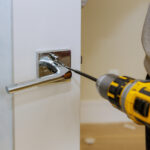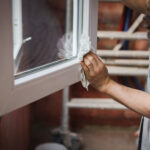Window condensation might seem harmless, but it can lead to significant damage in your home. This detailed guide explains what causes it, the risks it poses, and how Canadian homeowners can prevent it—plus when to call in the pros for the best windows and doors solutions.
Understanding Window Condensation: What It Really Means
For many Canadian homeowners, spotting moisture on the inside of their windows is a common sight—especially during our long winters. While it might appear as a minor annoyance, window condensation is actually a red flag signalling potential problems in your home. Left unchecked, it can lead to mould, wood rot, and even structural damage. Understanding what causes condensation and how to handle it is key to protecting your home and maintaining energy efficiency.
What Is Window Condensation?
Window condensation is the appearance of water droplets or fog on your window panes. It typically forms when warm, moist indoor air comes into contact with the cold surface of your windows, particularly in the winter. As the warm air cools rapidly on the glass, it releases moisture in the form of condensation.
Common Types of Window Condensation
- Interior Condensation – This is the most common type. It appears on the inside of your windows and is usually caused by high humidity indoors.
- Exterior Condensation – Typically seen in the summer, this occurs when humid outdoor air contacts a cool window surface. It’s usually not a concern.
- Between-the-Glass Condensation – This is a sign of a failed window seal and often means your window’s insulating gas has escaped, reducing energy efficiency.
Is Window Condensation Always a Problem?
Not necessarily. Occasional condensation could simply mean your home is well-insulated. However, persistent or excessive moisture is a sign that you might have ventilation or insulation issues. It can also indicate that your windows are no longer functioning properly, and you may need to consider replacement options with the best windows and doors company in your area.
Why Window Condensation Is a Silent Home Destroyer
Window condensation may look innocent, but over time, it can lead to serious damage. It’s called the “silent destroyer” because it often works behind the scenes, leading to hidden problems that can be expensive to fix if ignored.
1. Promotes Mould and Mildew Growth
Excess moisture is a breeding ground for mould and mildew. Spores can form on window sills, walls, and even in the insulation around your windows. This not only damages your home but can also affect your health. For allergy sufferers and those with respiratory conditions, mould can make symptoms worse. In Canada’s cold climate, this risk increases during the winter when windows stay shut and ventilation is minimal.
2. Damages Window Frames and Walls
Wooden window frames are particularly vulnerable to moisture damage. Over time, condensation can cause the wood to swell, rot, and warp, leading to costly repairs or replacements. Even vinyl frames can suffer from damaged seals and insulation. Drywall and paint around the windows can also blister or peel due to constant moisture exposure.
If you notice signs of damage, it may be time to contact our certified technicians for a professional evaluation or expert window repair.
3. Reduces Energy Efficiency
Condensation between the panes of double or triple-glazed windows usually signals a broken seal. This means the insulating gas—often argon or krypton—has leaked out, leaving your window much less efficient. Your heating system will have to work harder, driving up your energy bills. If you’re noticing this issue, it might be time to consider replacing your units with the best windows for home.
4. Weakens Structural Integrity
Long-term exposure to moisture can impact more than just the windows. It can weaken surrounding structures, including wall studs and flooring. This type of hidden damage can cost thousands in repairs, especially if it leads to a compromise in your home’s structural integrity. Prevention is key, and early detection is essential in protecting your investment.
What Causes Window Condensation in Canadian Homes?
Canadian climate plays a big role in the development of window condensation. From the freezing cold winters of Alberta to the humid summers in Ontario, weather fluctuations contribute to indoor moisture problems. But climate isn’t the only factor. Your lifestyle and home’s construction also matter.
Indoor Humidity Levels
Daily activities such as cooking, showering, laundry, and even breathing add moisture to the air. If your home is sealed tightly for energy efficiency, the moisture has nowhere to go, leading to increased humidity and condensation on windows. Homes with older ventilation systems or poor airflow are especially prone to this issue.
Window Quality and Age
Older windows, especially single-pane ones, don’t insulate well. They allow heat to escape and cold to enter, which encourages condensation. Even older double-pane windows can lose their effectiveness over time if the seals break. That’s why many homeowners are now investing in the best windows in Canada that meet modern energy-efficiency standards.
Inadequate Ventilation
Poor airflow prevents excess moisture from escaping. Bathrooms, kitchens, and laundry rooms should have exhaust fans that vent outdoors. In some homes, especially older ones, these fans are either missing or ineffective. This leads to a build-up of moisture that can ultimately settle on your windows.
Drastic Indoor-Outdoor Temperature Differences
In winter, the warm indoor air meets the cold window surface, leading to condensation. In Canada, where outdoor temperatures can drop well below freezing, this contrast can be extreme. The greater the difference, the more likely condensation is to form—especially if your windows lack proper insulation.
How to Prevent and Reduce Window Condensation
Now that you know the risks, here’s how to tackle condensation before it becomes a serious issue. Many solutions are simple and affordable, while others may require professional help.
1. Control Indoor Humidity
- Use a hygrometer to measure indoor humidity. Keep it between 30–50%.
- Install dehumidifiers in moisture-prone areas.
- Avoid drying clothes indoors whenever possible.
- Cover pots while cooking and use stove fans.
Reducing indoor humidity is one of the most effective ways to prevent window condensation. In colder provinces like Manitoba or Saskatchewan, where homes are sealed tightly for warmth, it’s especially important to monitor moisture levels.
2. Improve Ventilation
- Open windows for a few minutes daily to let stale air out.
- Ensure bathroom and kitchen exhaust fans are functional and vent outdoors.
- Consider installing an HRV (Heat Recovery Ventilator) system to maintain airflow without losing heat.
Proper ventilation not only reduces humidity but also improves indoor air quality—a win-win for health and home comfort.
3. Upgrade Your Windows
If you’re dealing with persistent condensation, your windows may be the problem. Upgrading to energy-efficient models with Low-E coatings and inert gas fills can make a huge difference. Look for ENERGY STAR® certified products designed for Canadian climates. These windows are built to handle harsh weather while maintaining insulation.
Choosing the best windows and doors company ensures proper installation and long-term performance. A poor installation job can turn even the best windows into energy-wasting liabilities.
4. Seal Air Leaks
Drafts around windows allow warm air to escape and cold air to enter, increasing condensation risk. Use weatherstripping or caulking to seal gaps. Pay special attention to the frames and sills. If you’re constantly sealing the same areas, it might be time to invest in the best windows for home that are properly sealed and insulated.
5. Replace Failed Seals and Damaged Units
If you notice condensation between the panes, this means the seal has failed, and the window’s insulating properties are compromised. In this case, it’s not just about comfort—you’re losing money on heating bills. It’s often more cost-effective to replace the window entirely with products from the best window replacement company near me than to repair the seal.
6. Use Window Insulation Kits in Winter
Clear plastic film insulation kits are a budget-friendly way to add an extra layer of protection in the winter months. They reduce drafts and help keep the inner glass surface warmer, minimizing condensation. While not a permanent solution, they’re useful for older windows until a full replacement can be arranged.
When to Call the Experts: Recognizing It’s Time for Professional Help
For many Canadian homeowners, pinpointing when to switch from DIY fixes to professional assistance can be tricky. While basic solutions like using dehumidifiers or sealing drafts are great starting points, they often provide only temporary relief. If your condensation issues persist despite your best efforts, it may be time to bring in a trusted expert.
Signs That Call for Professional Window Repair or Replacement
- Condensation consistently forms between window panes
- Visible damage to window frames or sills
- Windows feel drafty even when closed
- Difficulties opening or closing windows
- Your energy bills are steadily increasing without other explanation
These signs suggest your windows have lost their effectiveness and could be costing you more in the long run—both in energy and potential damage. If you’re experiencing these symptoms, contact our certified technicians for a full inspection and expert window repair.
Choosing the Best Window Replacement Company Near You
When it’s time to replace your windows, don’t settle for less. Choosing the best window replacement company near me ensures that your new windows are not only durable and energy-efficient but also installed to meet Canadian building standards. At Fortify Services, we offer customized solutions for our unique climate—from prairie winters to Atlantic storms.
Our window replacement services are backed by certified installers and high-quality materials, making us the go-to choice for homeowners looking to upgrade with the best windows in Canada. Whether you’re in Toronto, Vancouver, or a smaller community, we bring local expertise and high standards to every job.
Long-Term Solutions: Investing in the Best Windows and Doors
While temporary fixes can help reduce window condensation, the most effective and lasting solution is upgrading to high-performance windows and doors. These systems are specifically designed for Canadian homes, offering superior insulation, durability, and protection.
Key Features to Look for in New Windows
Not all windows are created equal. If you’re upgrading, look for these features to ensure long-term value and energy savings:
- ENERGY STAR® Certification – Guarantees performance based on Canadian climate zones
- Low-E Glass Coating – Reduces heat loss while allowing natural light
- Double or Triple Glazing – Improves thermal performance and reduces outside noise
- Inert Gas Fills – Argon or krypton gas between panes for better insulation
- Durable Frames – Vinyl, fibreglass, or composite materials for longevity and low maintenance
These features are what set the best windows and doors company apart. At Fortify Services, we use only top-quality products that meet or exceed Canadian standards, ensuring your investment pays off for years to come.
Benefits of Replacing Your Windows and Doors
Investing in the best windows and doors Toronto has to offer comes with several benefits beyond just reducing condensation:
- Lower monthly energy bills through improved insulation
- Increased property value and better curb appeal
- Enhanced indoor comfort year-round
- Reduced outside noise for a quieter home
- Improved security with stronger locking systems
When you choose Fortify Services, you’re not just getting new windows—you’re upgrading your entire living experience with the best windows for home comfort, efficiency, and safety.
Window Condensation in Different Canadian Regions: A Closer Look
Canada’s vast geography means homeowners across the country face different challenges when it comes to window condensation. Understanding your local environment can help you choose the right solutions for your area.
Western Canada: British Columbia and Alberta
In B.C., coastal humidity can cause frequent exterior condensation, especially in the mornings. While this is usually harmless, persistent interior condensation may be a sign of ventilation issues. Alberta’s harsh winters, on the other hand, often lead to interior condensation due to drastic indoor-outdoor temperature differences. Homes in colder regions benefit from triple-glazed windows and HRV systems to maintain air quality and reduce moisture.
Central Canada: Ontario and Quebec
Ontario homeowners—especially in urban centres like Toronto—often deal with both summer humidity and winter cold. The fluctuating weather makes proper insulation and ventilation key. Investing in the best windows and doors Toronto offers can significantly reduce condensation and energy loss. In Quebec, older homes may lack modern insulation, making retrofitting with energy-efficient windows a wise move.
Prairies: Manitoba and Saskatchewan
Winters in the Prairies are long and frigid, making airtight homes essential. However, this airtightness can trap moisture inside. Condensation is common, and without proper humidity control, it can become a serious problem. Window upgrades with Low-E coatings and multi-pane glass are vital in these regions.
Atlantic Canada: Nova Scotia, New Brunswick, Newfoundland & Labrador
High humidity and salt air can accelerate wear and tear on windows and doors. In these provinces, choosing corrosion-resistant frames and high-performance seals is crucial. Proper ventilation systems and dehumidifiers are also recommended to manage interior moisture levels.
Maintaining Your Windows to Prevent Future Condensation
Even the best windows and doors need regular maintenance to perform at their best. Here are some tips to keep your windows in top shape and minimize condensation over time.
Inspect and Clean Regularly
Check your windows every season for signs of wear: cracked seals, moisture buildup, or warping. Clean the glass and frames to remove dirt and prevent mould growth. Use a mild soap solution and avoid harsh chemicals that could damage the finish.
Reapply Weatherstripping and Caulking
Over time, weatherstripping and caulking can deteriorate. Replacing these materials helps close gaps and prevent drafts, keeping your home sealed and efficient. This is especially important going into winter, when condensation risks are highest.
Test for Air Leaks
Use a lit incense stick near the window edges to test for drafts. If the smoke wavers, you may have a leak. Sealing these areas can greatly improve insulation and reduce moisture problems. If the leaks persist, consider upgrading with professional window installation services.
Schedule Professional Inspections
Having a window specialist inspect your home annually can catch small issues before they become big problems. At Fortify Services, our experts assess not just the windows, but the surrounding structure and ventilation systems to provide a complete picture of your home’s health.
Why Fortify Services Is Your Trusted Partner in Window Solutions
As a Canadian company, Fortify Services understands the unique needs of homeowners across the country. From harsh prairie winters to the damp coastal air, our team is trained to identify and resolve condensation issues with precision and care.
What Sets Us Apart
- Certified Technicians – Our team is trained, licensed, and experienced in Canadian building standards.
- High-Quality Products – We use only the best windows Canada has to offer, designed for local conditions.
- Custom Solutions – We tailor our services to your home and region, ensuring long-lasting results.
- Transparent Pricing – No hidden fees. Just honest, professional service.
- Local Expertise – We serve communities across Canada, with a strong presence in major cities and small towns alike.
Whether you’re upgrading for efficiency or addressing ongoing condensation issues, Fortify Services is here to help with everything from professional door installation services to complete window replacements.
Conclusion: Take Control of Window Condensation Today
Window condensation might seem minor, but it’s a sign of deeper issues that can seriously affect the comfort, safety, and value of your home. From mould growth and energy loss to structural damage, the risks are real—but so are the solutions.
By understanding the causes, taking preventative measures, and knowing when to bring in the professionals, you can protect your investment and enjoy a healthier, more efficient home. Whether you need repairs, replacements, or expert advice, Fortify Services is your trusted partner across Canada.
Ready to eliminate condensation for good? Contact Fortify Services today to schedule a consultation and discover why we’re the best windows and doors company for Canadian homeowners. Let us help you fortify your home—beautifully and efficiently.









